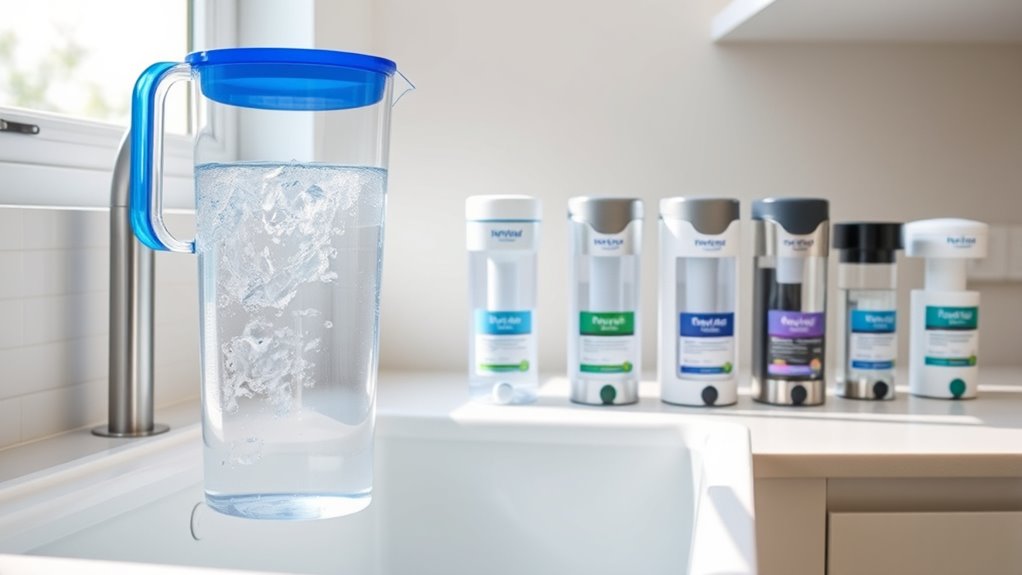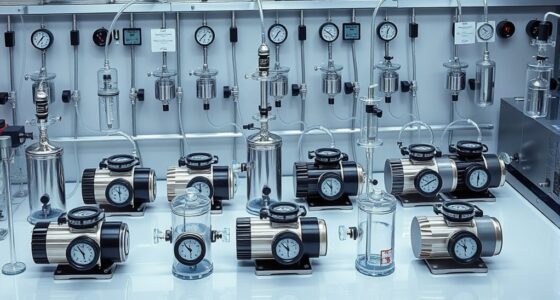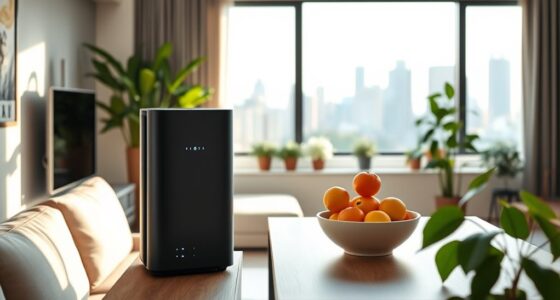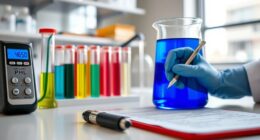If you want safe, clean drinking water, I recommend exploring top filters certified to remove PFAS and other chemicals. Options like under sink systems, refrigerator filters, and pitcher filters use activated carbon, multi-stage media, and reverse osmosis to effectively block contaminants. Brands like Aquasana, Aquagear, and Epic Water are highly reliable. Keep an eye on NSF certification to guarantee quality. If you continue, you’ll discover more about the best options tailored for your needs.
Key Takeaways
- Look for NSF/ANSI certifications 53, 42, or 401, confirming effective removal of PFAS, heavy metals, and chemicals.
- Reverse osmosis systems like iSpring RCC7AK remove over 95% of PFAS and other contaminants for high-purity water.
- Multi-stage activated carbon and KDF filters effectively target microplastics, pharmaceuticals, chlorine, and PFAS.
- Whole house systems provide comprehensive, long-lasting filtration for entire households against a wide range of pollutants.
- Choose certified, durable filters that meet third-party testing standards for consistent, safe drinking water.
Aquasana Under Sink Water Filter System

If you’re looking for an effective solution to remove PFAS and other contaminants from your tap water, the Aquasana Under Sink Water Filter System is an excellent choice. It reduces up to 99% of 78 pollutants, including lead, mercury, pesticides, microplastics, pharmaceuticals, chlorine, and PFAS like PFOA and PFOS. It retains beneficial minerals such as calcium and potassium, ensuring better-tasting, healthier water for drinking, cooking, and beverages. Certified in 2023 to NSF/ANSI Standards, it offers full filtration with minimal waste and cost—around 10 cents per gallon. Easy to install and maintain, it’s a reliable, stylish addition to any kitchen.
Best For: households seeking an effective, cost-efficient under-sink water filtration system that removes a wide range of contaminants, including PFAS, while preserving beneficial minerals.
Pros:
- Highly effective at reducing up to 99% of 78 contaminants, including lead, PFAS, mercury, and pesticides.
- Easy DIY installation with minimal maintenance, and replacement filters last six months or 800 gallons.
- Stylish, durable design with a lead-free metal faucet that complements various kitchen decors.
Cons:
- Plastic housing should be replaced every five years to prevent cracking, especially under high water pressure.
- Initial taste may be sulfur-like, requiring thorough flushing to achieve optimal flavor.
- Water flow rate can decrease at lower water pressures, potentially extending flushing times.
GLACIER FRESH Refrigerator Water Filter Replacement (3 Pack)
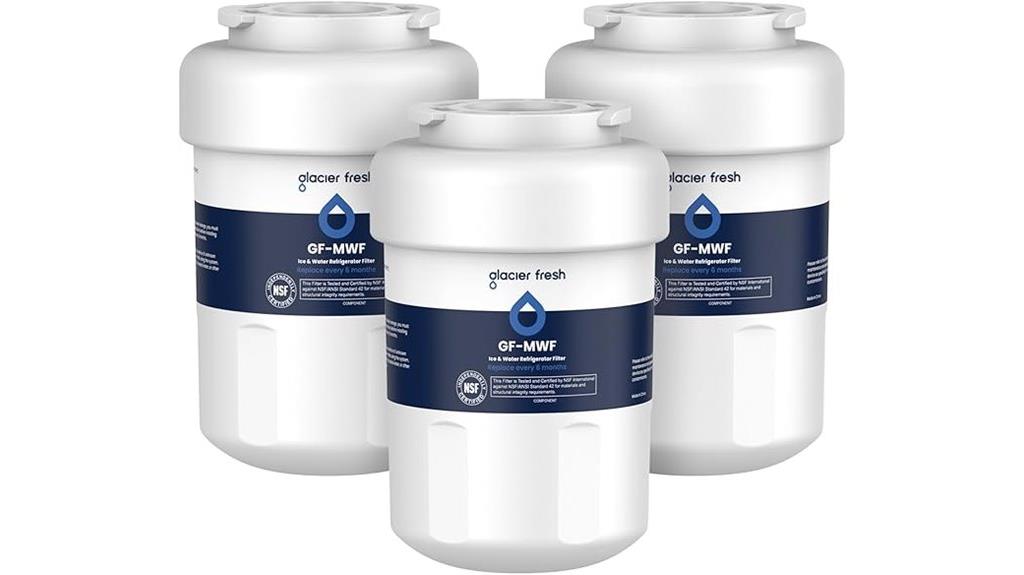
The Glacier Fresh Refrigerator Water Filter Replacement (3 Pack) stands out as an excellent choice for budget-conscious homeowners seeking reliable, high-quality filtration. Made with Sri Lankan activated carbon, it meets NSF42 standards and effectively removes 97.9% of chlorine, enhancing water taste and smell. Compatible with numerous models, including GE and Kenmore, it features an easy twist-and-lock installation and a six-month lifespan or 300 gallons. Customers praise its affordability, ease of use, and water quality improvements, often matching or surpassing original filters at a fraction of the cost. This pack offers great value for those wanting consistent, safe drinking water from their refrigerator.
Best For: budget-conscious homeowners seeking reliable, high-quality refrigerator water filtration at an affordable price.
Pros:
- Effectively removes 97.9% of chlorine, improving taste and odor
- Easy twist-and-lock installation for a leak-proof, tool-free setup
- Compatible with multiple refrigerator brands and models, offering versatility
Cons:
- Some users experience initial sputtering during installation
- Slightly lower NSF rating compared to premium filters, may be a concern for extra filtration needs
- Average lifespan of six months may require more frequent replacements for heavy users
DWSP Microplastic Water Filter with NSF Certification
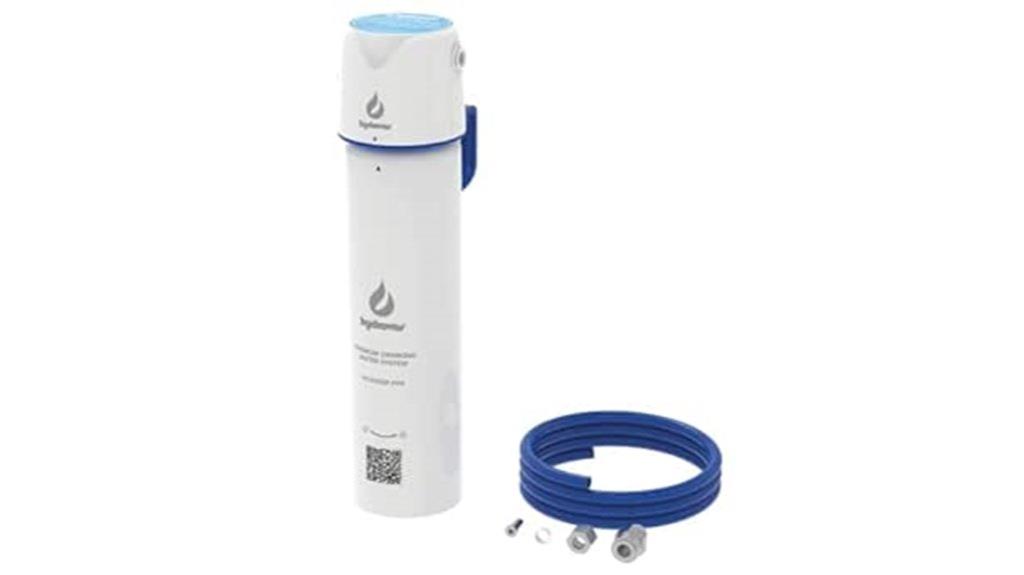
The DWSP Microplastic Water Filter with NSF Certification is an excellent choice for households and small businesses seeking reliable removal of microplastics, pharmaceuticals, and lead. Certified by IAPMO R&T for 1651 gallons (~6 months), it features high flow (1.5 GPM) and fits easily under sinks. Its advanced filtration reduces particles smaller than 1 micron, enhancing water taste and safety by removing chlorine, cysts, asbestos, and contaminants like PFOA and PFOS. Simple to install with quick connect fittings, it’s compatible with existing systems and provides extensive pollutant reduction at an affordable price. Regular maintenance keeps your water clean, safe, and great-tasting.
Best For: households and small businesses seeking an affordable, reliable, and easy-to-install water filter that effectively reduces microplastics, pharmaceuticals, lead, and other contaminants.
Pros:
- Certified to reduce a wide range of pollutants including microplastics, lead, pharmaceuticals, and chlorine taste and odor
- High flow rate of 1.5 GPM and capacity of 1651 gallons (~6 months) ideal for daily use
- Compact, DIY-friendly design with quick connect fittings for easy installation under sinks
Cons:
- Some users report difficulty removing cartridges and minor water spills during filter changes
- Plastic hoses are polyethylene and may leach chemicals; stainless steel options are preferred by some users
- Not all filters are fully NSF certified; verification through official sources is recommended
Epic Water Filters Smart Shield Under Sink Water Filter
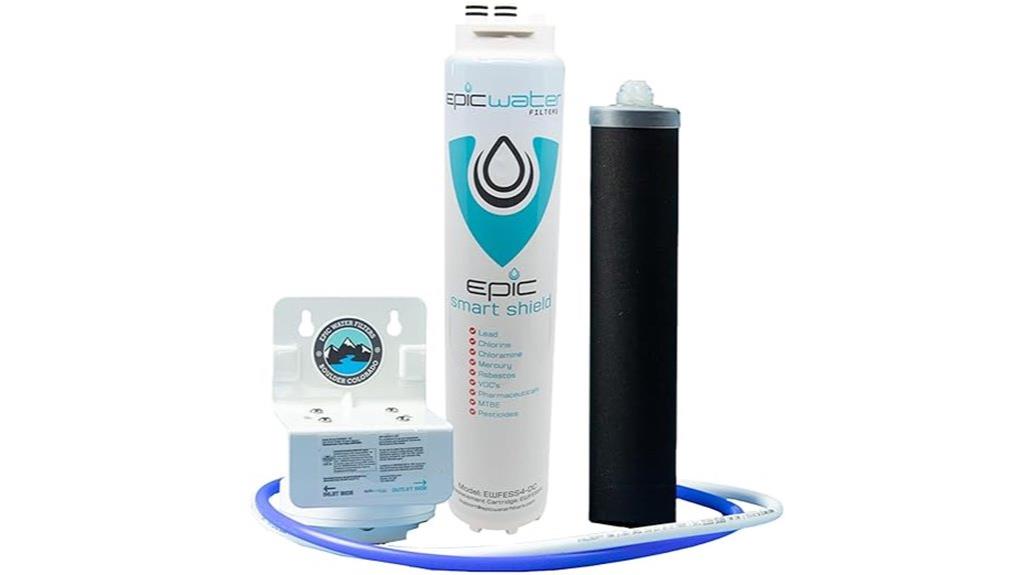
Looking for an under sink water filter that effectively tackles a wide range of contaminants, including PFAS? The Epic Water Filters Smart Shield is NSF-certified to meet standards 42, 53, and 401, ensuring it removes chlorine, heavy metals, pharmaceuticals, pesticides, and volatile organic compounds. Its solid carbon block filtration improves taste, odors, and clarity while preventing mold and bacteria growth. Easy to install with push-in fittings, it connects directly to cold water lines and offers a dedicated faucet for filtered water. Maintenance is straightforward, with filters lasting about a year. Overall, it’s a reliable, eco-friendly choice that guarantees cleaner, safer drinking water.
Best For: households seeking an easy-to-install, comprehensive under sink water filter that effectively removes a wide range of contaminants, including PFAS, for safer drinking water.
Pros:
- NSF-certified to standards 42, 53, and 401, ensuring thorough contaminant removal
- Simple DIY installation with push-in fittings and clear instructions
- Improves water taste, odors, and clarity while preventing mold and bacteria growth
Cons:
- Some users experience initial flow restrictions if washers are not seated properly
- Filter replacement costs around $100 annually, which may be higher than some fridge filters
- Plastic fittings could be less durable; some users prefer stainless steel components
Aquagear Water Filter Pitcher

If you’re seeking a water filter that effectively removes a wide range of contaminants, including PFAS compounds like PFOA and PFOS, the Aquagear Water Filter Pitcher is an excellent choice. It removes 20 times more contaminants than traditional pitchers, including lead, chlorine, microplastics, and harmful chemicals, while preserving essential minerals like calcium and magnesium. Made in the USA with third-party testing, it produces clean, great-tasting water. The filter lasts around 120 gallons—three times longer than standard filters—and is recyclable. Although some users experience slow filtering and pouring issues, many appreciate its effectiveness, durability, and positive impact on water quality.
Best For: those seeking a highly effective water filter that removes a wide range of contaminants while maintaining essential minerals and providing great-tasting water.
Pros:
- Removes 20X more contaminants than traditional pitchers, including lead, microplastics, and harmful chemicals like PFOA and PFOS
- Filter lasts approximately 120 gallons, three times longer than standard filters, reducing replacement costs
- Made in the USA with third-party testing, ensuring quality and reliable filtration performance
Cons:
- Slow filtering process can take up to 2 hours for a full cycle, which may be inconvenient
- Pouring issues such as spillage and difficulty with auto-closing flaps can occur, requiring careful handling
- Larger size may be cumbersome for small hands or limited refrigerator space
Waterdrop WD-PF-01A Plus Replacement Filters for Waterdrop Pitcher Filtration System (Pack of 4)
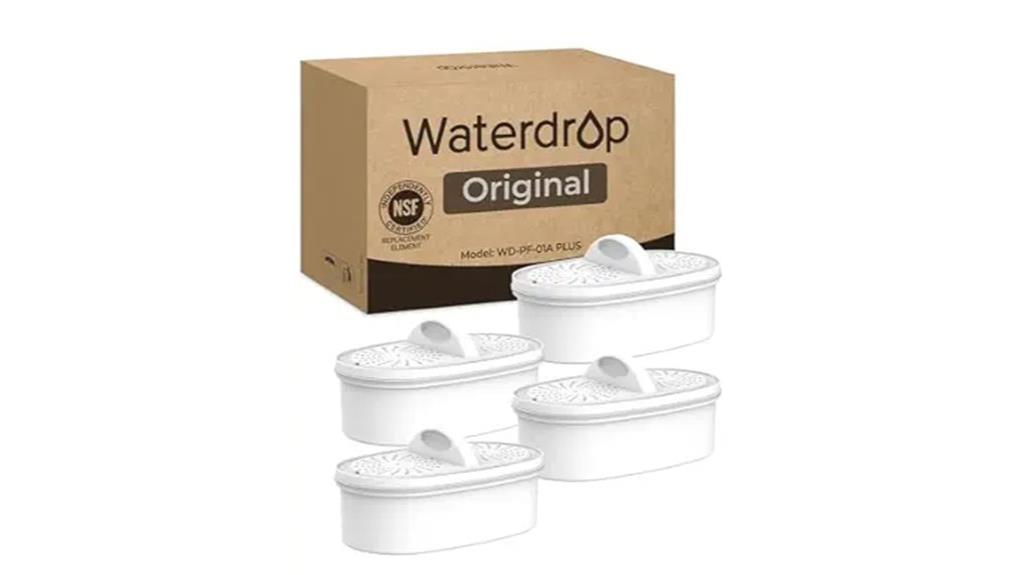
For households seeking reliable protection against harmful contaminants like PFAS, the Waterdrop WD-PF-01A Plus Replacement Filters stand out as an excellent choice. Compatible with all Waterdrop pitcher models, these filters feature advanced multi-stage technology, including activated carbon fiber with Japanese absorption capabilities that outperform standard filters. They effectively remove PFAS, PFOA/PFOS, arsenic, chlorine, and odors, delivering fast, clean water at a flow rate of 0.3 gpm. With a lifespan of over 200 gallons, they are cost-effective and easy to replace, ensuring consistent access to healthier water. Customers appreciate their performance, durability, and the brand’s responsive customer service.
Best For: households seeking reliable, fast, and effective water filtration to remove harmful contaminants like PFAS, arsenic, and chlorine from their drinking water.
Pros:
- Advanced multi-stage filtration technology with Japanese activated carbon fiber for superior impurity removal
- Compatible with multiple Waterdrop pitcher models, ensuring versatility and easy replacement
- Long-lasting filters capable of filtering over 200 gallons, providing cost-effective and environmentally friendly water purification
Cons:
- Some users may experience initial white beads or black particles in water, which typically clear after flushing
- Full pitchers can be heavy (around 10 lbs), making them cumbersome for some users to handle
- Slight variations in water taste after initial flushing, which may require some adjustment
LifeStraw Home Replacement Filter for Tap Water Filtration (1-Pack)
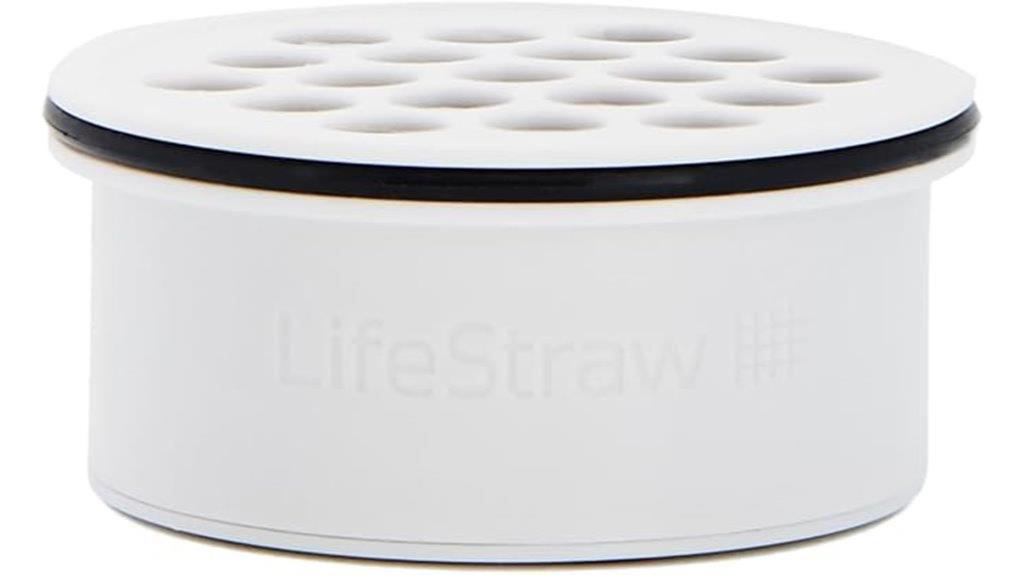
The LifeStraw Home Replacement Filter is an excellent choice for anyone seeking reliable tap water filtration that removes a wide range of contaminants, including PFAS. It provides a two-month supply, filtering up to 150 liters of water, and protects against over 30 pollutants such as bacteria, parasites, microplastics, heavy metals, chlorine, pesticides, herbicides, and chemicals. The filter preserves essential minerals while improving taste and safety. Made of durable plastic and easy to replace, it requires no batteries and meets strict EPA and NSF/ANSI standards. Customer reviews highlight its effectiveness, long-lasting performance, and the positive impact on water quality.
Best For: individuals seeking a reliable, effective tap water filter that removes a wide range of contaminants while preserving essential minerals.
Pros:
- Filters out over 30 contaminants including heavy metals, bacteria, parasites, microplastics, and PFAS.
- Easy to replace with a lightweight, compact design that requires no batteries.
- Certified to meet EPA and NSF/ANSI standards, ensuring high safety and performance.
Cons:
- Replacement filters need to be changed every two months to maintain optimal performance.
- Some users have reported concerns about packaging authenticity and delivery issues.
- The filter’s capacity is limited to approximately 150 liters (40 gallons) per filter, requiring regular replacements.
iSpring Whole House Water Filter System (WCB32C-KS)
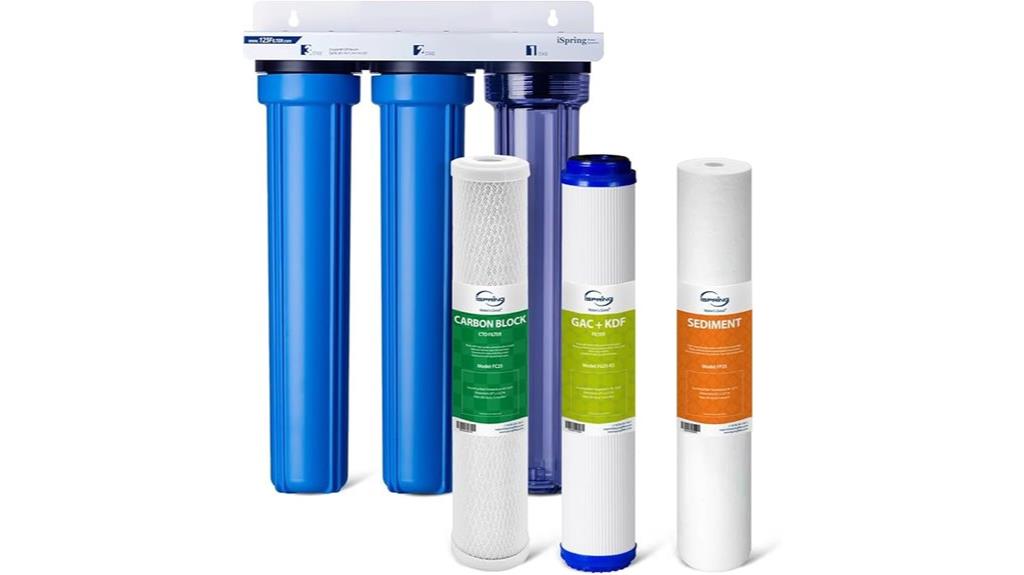
The iSpring Whole House Water Filter System (WCB32C-KS) stands out as an excellent choice for households seeking extensive removal of contaminants like PFAS, lead, chlorine, and sediments. Its 3-stage filtration combines a high-performance sediment filter, GAC and KDF composite layers, and CTO filters to deliver clean, safe water throughout your home. Designed for durability and easy maintenance, it’s suitable for families, providing up to 30,000 gallons of filtered water. Users report noticeable improvements in taste, odor, and water quality, along with peace of mind from harmful metals and chemicals. Installation is straightforward, and customer support is highly rated, making this system a reliable choice.
Best For: households seeking comprehensive, multi-stage filtration to remove metals, chemicals, and sediments for clean, safe water throughout their home.
Pros:
- Effective 3-stage filtration system reduces lead, chloramine, PFAS, chlorine, sediments, radon, and H2S.
- Durable design with easy-to-monitor transparent housing and straightforward installation.
- High customer satisfaction with excellent support, long filter life of up to six months, and significant improvements in water taste and odor.
Cons:
- Requires manual operation and filter replacement every six months, which may be maintenance-intensive for some users.
- Proper sealing during installation (e.g., using Teflon tape) is essential to prevent leaks.
- Slightly bulky size (18L x 7W x 25H inches) might require designated space for installation.
iSpring RCC7AK 6-Stage Reverse Osmosis System with Alkaline pH+ Remineralization
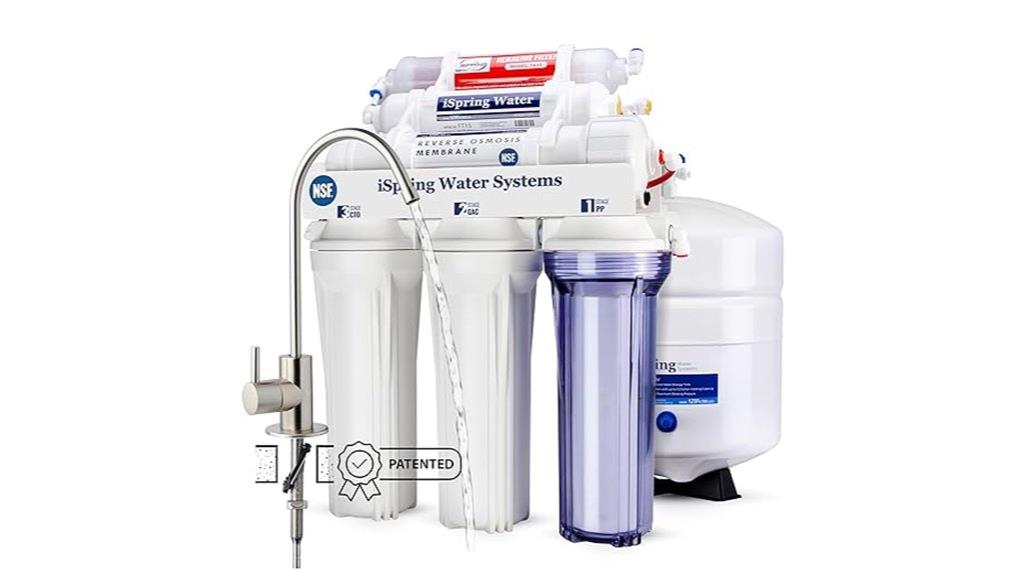
If you’re seeking a reliable solution to remove PFAS and other contaminants from your drinking water, the iSpring RCC7AK 6-Stage Reverse Osmosis System stands out with its advanced filtration and remineralization features. It’s easy to install with a top-mounted fastener, fitting inside standard cabinets and requiring about an hour. Certified to NSF standards, it removes up to 99% of PFAS, chlorine, asbestos, heavy metals, fluoride, and over 1,000 contaminants. The transparent filter housing allows monitoring, and the system produces great-tasting water. Backed by excellent customer support, it’s a durable, efficient choice for clean, safe drinking water in your home.
Best For: Homeowners seeking reliable, high-efficiency removal of PFAS, heavy metals, and other contaminants with added remineralization for improved water taste and quality.
Pros:
- Certified NSF/ANSI 58 and 372 standards ensuring effective contaminant reduction
- Easy installation with a top-mounted fastener and clear instructions, taking about an hour
- Durable, high-quality parts with excellent customer support and easy filter maintenance
Cons:
- Filter replacement intervals can vary based on incoming water quality, potentially requiring more frequent changes in high-TDS areas
- Reject water ratio (about 1.5:1) may lead to water waste if not repurposed
- Slight pH increase post-filtration may be minimal, requiring additional remineralization for those seeking higher alkalinity
FRIGIDAIRE ULTRAWF Pure Source Ultra Water Filter, Original, White, 1 Count
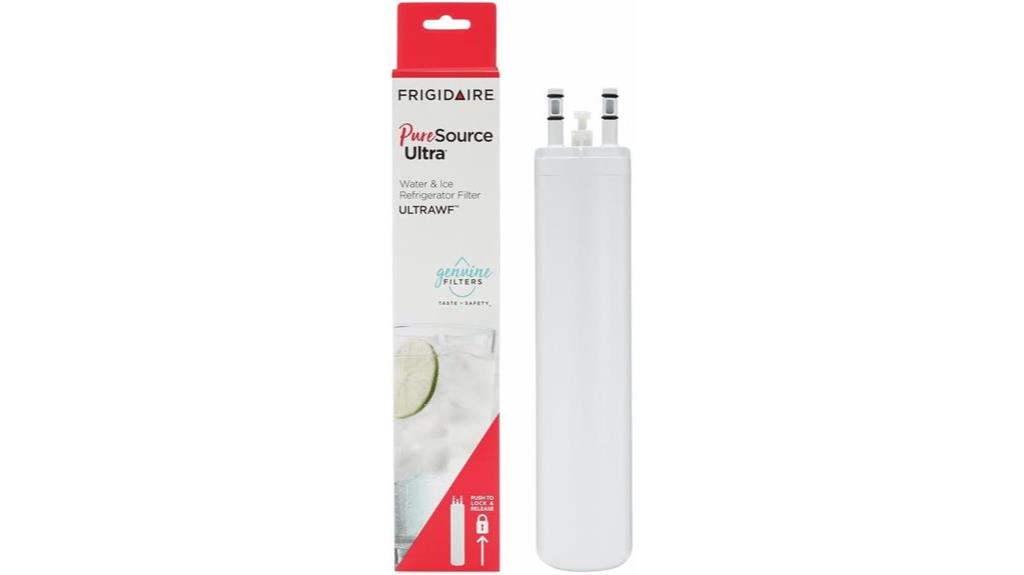
For anyone seeking a reliable filter to improve their refrigerator water, the FRIGIDAIRE ULTRAWF Pure Source Ultra Water Filter offers an effective solution. It’s designed with a carbon-based filter that removes chlorine odor, enhances taste, and reduces impurities like lead, nitrates, pesticides, and mercury. Certified by NSF and WQA, it guarantees quality and sustainability. Easy to install, just remove the old filter, insert the new one, and run water for three minutes to prime it. With a lifespan of around six to eight months, it consistently delivers clean, great-tasting water and ice. Customers praise its fit, performance, and straightforward replacement process.
Best For: those seeking an easy-to-install, reliable water filter that improves taste and reduces impurities in their refrigerator water and ice.
Pros:
- Certified by NSF and WQA for quality and sustainability.
- Easy to install with a simple replacement process.
- Effectively removes chlorine, lead, nitrates, pesticides, and mercury, enhancing water flavor and clarity.
Cons:
- Price increases and occasional supply shortages reported by some users.
- Rated at 5 microns, some customers prefer a finer 1-micron filtration.
- Limited to compatible Frigidaire refrigerators with PureSource Ultra system, not universal.
Replacement Water Filter for Pitcher Filtration System
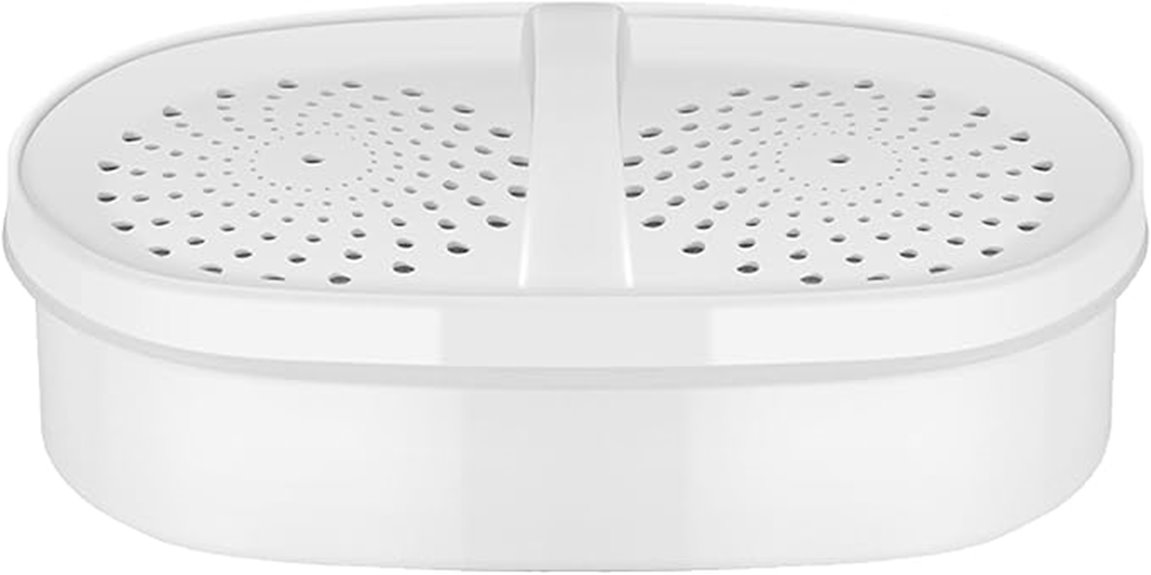
Those seeking a cost-effective, reliable solution to reduce PFAS in their drinking water will appreciate these replacement filters for pitcher systems. Designed for compatibility with various Waterdrop models and Fachioo kettles, they feature advanced 4-stage filtration tested by third-party labs and NSF-certified standards. Made with activated carbon fiber, these filters effectively remove PFAS, chlorine, heavy metals, and odors while preserving beneficial minerals. Lasting up to three months or 200 gallons, they deliver quick flow rates and easy installation. Customers praise their ability to improve water taste, quality, and safety, making them a smart choice for clean, safe drinking water at an affordable price.
Best For: those looking for an affordable, high-quality water filtration solution that effectively reduces PFAS, heavy metals, and odors in tap water.
Pros:
- Certified NSF and tested by third-party labs for safety and effectiveness.
- Long-lasting filter lifespan of up to 3 months or 200 gallons, reducing replacement frequency and costs.
- Easy to install with a quick flow rate, providing immediate access to clean, great-tasting water.
Cons:
- Smaller and lighter than some original filters, which may concern users about durability.
- Effectiveness in removing certain chemicals depends on the activated charcoal content and filtration capacity.
- Limited to pitcher and compatible system use; not suitable for direct tap installation or other filtration systems.
2 Pack Waterdrop Water Filter Replacement for Pitchers
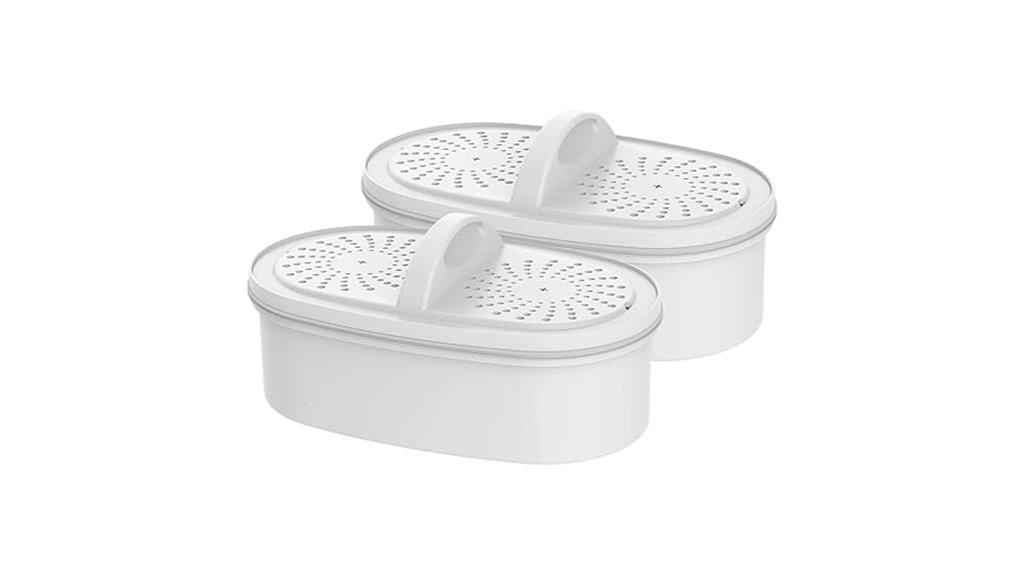
The Pack Waterdrop Water Filter Replacement for Pitchers is an excellent choice for anyone seeking reliable, cost-effective filtration that effectively reduces PFAS and other contaminants. These filters are compatible with Waterdrop® pitchers and dispensers, including models WD-PT-05, WD-PT-07, and others. They use advanced activated carbon fiber technology, which absorbs more impurities, ensuring cleaner, better-tasting water. Each filter can handle over 200 gallons—lasting about three months—saving money and reducing plastic waste. Easy to install and maintain, they deliver quick, filtered water and markedly improve taste and odor. Overall, they’re a smart, economical upgrade for healthier, safer drinking water.
Best For: those seeking affordable, reliable water filtration replacements compatible with Waterdrop® pitchers to ensure cleaner, better-tasting water.
Pros:
- Effectively reduces PFAS, chlorine, heavy metals, and odors for improved water quality
- Long-lasting filters that provide up to three months of use, filtering over 200 gallons
- Easy to install and compatible with multiple Waterdrop® pitcher models
Cons:
- Slight differences in filtration performance compared to original filters may be noticed
- Some users report a residual swampy taste in tap water after filtration
- May be difficult to find in retail stores, requiring online purchase
Factors to Consider When Choosing Water Filters for PFAS and Other Chemicals
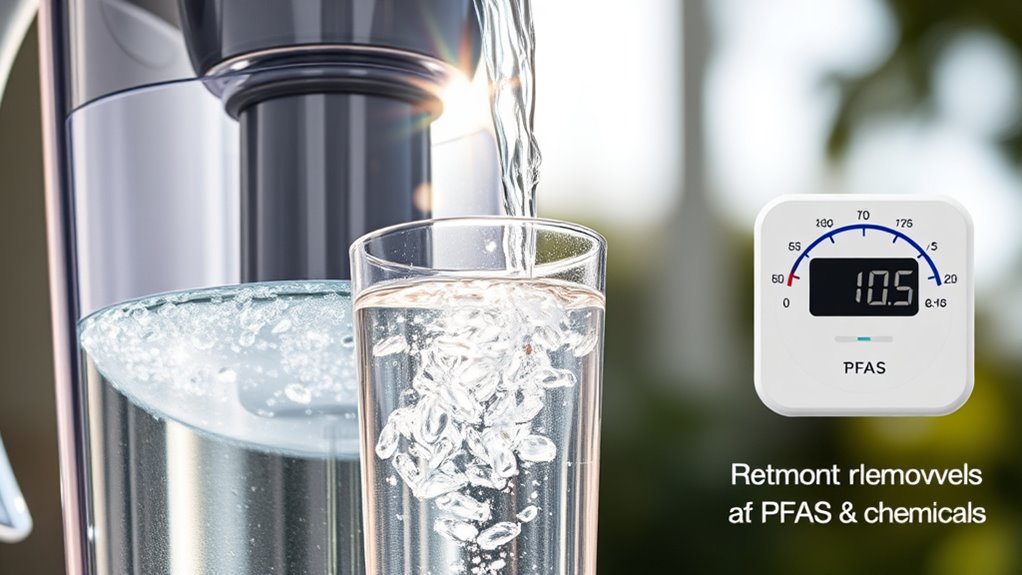
When selecting a water filter for PFAS and other chemicals, I look at certification standards to guarantee it’s tested and reliable. I also consider the filtration technology and how effectively it removes specific contaminants. Additionally, I check the filter’s lifespan, cost, and how easy it is to install and maintain.
Certification Standards Needed
Choosing the right water filter for PFAS and other chemicals starts with checking its certification standards. Look for certifications like NSF/ANSI 53 and NSF/ANSI 401, which confirm the filter’s ability to reduce PFAS and other contaminants to safe levels. NSF/ANSI 42 guarantees the filter improves water taste and odor by removing chlorine and particulates, supporting overall chemical reduction. It’s also important to verify third-party testing from organizations like IAPMO or the Water Quality Association, which provide verified claims of contaminant removal, including PFAS. The presence of NSF certification for specific chemicals indicates the filter has undergone rigorous testing to meet strict safety and performance benchmarks. Always ensure the certification covers the chemicals you’re concerned about, such as PFAS, pharmaceuticals, or heavy metals.
Filtration Technology Used
Selecting the right filtration technology is vital for effectively removing PFAS and other chemicals from your water. Activated carbon, reverse osmosis, and multi-stage media are common choices, each offering unique benefits. Advanced carbon block filters use depth and adsorption methods to capture microplastics, pharmaceuticals, and volatile organic compounds, providing thorough purification. Reverse osmosis systems rely on semi-permeable membranes that reject over 95% of PFAS, heavy metals, and chemicals, delivering high-purity water. Multi-stage filters combine pre-filters, activated carbon, and specialized media to target a wide range of pollutants while maintaining beneficial minerals. It’s essential to choose a system that aligns with your specific needs and is certified by standards like NSF/ANSI 42, 53, or 401, ensuring reliable contaminant reduction.
Contaminant Removal Effectiveness
The contaminant removal effectiveness of a water filter depends largely on the certifications it has earned, such as NSF 53 for health-related claims or NSF 401 for emerging contaminants. These certifications confirm the filter’s proven ability to reduce specific chemicals, including PFAS like PFOA and PFOS, with some filters achieving up to 99% removal. High-performance filters often use multi-stage or activated carbon block technology to target a broad range of contaminants, such as microplastics, pharmaceuticals, and heavy metals. Advanced media designed to capture particles smaller than 1 micron enhance overall removal efficiency. However, maintaining ideal performance requires regular filter replacements, as saturation can diminish contaminant reduction over time. Certifications and technology are key factors in choosing an effective water filter for safe drinking water.
Filter Lifespan and Cost
When evaluating water filters for PFAS and other chemicals, it’s essential to take into account their lifespan and overall cost. Most filters last between 2 to 6 months, depending on usage and type. Longer-lasting filters, capable of filtering over 1,500 gallons, lower replacement frequency and reduce costs over time. The cost per gallon drops as filter lifespan extends, often falling below 10 cents per gallon with regular use. Regular replacements are crucial to ensure the filter continues to effectively remove contaminants, as performance declines once the filter reaches capacity. Monitoring water flow and taste can help identify when a filter needs replacement. Considering lifespan and cost helps guarantee you get the best value while maintaining safe, clean drinking water.
Installation and Maintenance Ease
Ease of installation and maintenance considerably impacts your overall experience with water filters for PFAS. I recommend choosing filters with clear, simple instructions and minimal tools needed, so you can set them up quickly without professional help. Look for models with twist-off or quick-change cartridges—these make replacing filters straightforward and save time. Electronic or visual indicators are helpful, signaling when it’s time for a filter change to keep performance ideal. Durability matters too; select systems with high-quality housings and fittings to prevent leaks or cracks, especially under high water pressure. Finally, prioritize low-maintenance features like long-lasting cartridges, typically lasting six months or over 800 gallons, and easy access for routine checks. These factors make maintaining your filter hassle-free and ensure consistent clean water.
Material Safety and Durability
Selecting a water filter for PFAS and other chemicals requires careful attention to the materials used in its construction. I look for filters made from food-grade, non-leaching plastics and activated carbon that meet NSF/ANSI standards, ensuring no harmful chemicals contaminate the water. Durability is vital; the media and housing should withstand regular use without degrading, typically lasting 6 months to 2 years depending on water quality. I prefer filters with certified, resistant materials that won’t break down or leach harmful substances over time. Reinforced housings or metal components add extra strength, preventing cracks or leaks during prolonged use. Finally, all parts in contact with water must be chemically stable, so they won’t introduce new contaminants into the filtered water.
Frequently Asked Questions
How Do Water Filters Remove Specific Chemicals Like PFAS?
You’re wondering how water filters remove specific chemicals like PFAS. I’ve found that many filters use activated carbon, which adsorbs these chemicals through tiny pores, trapping them effectively. Some advanced filters also incorporate reverse osmosis, which pushes water through a semi-permeable membrane, removing even tiny contaminants. I recommend checking the filter’s specs to guarantee it targets PFAS specifically, so you get safe, clean water every time.
Are There Filters Effective Against All Types of Water Contaminants?
Think of water filters as a fortress guarding your health. While some filters excel at blocking specific threats like chemicals or bacteria, no single filter can conquer all contaminants at once. I recommend choosing a multi-stage filter designed for broad-spectrum protection. It’s like having an all-star team—each member tackling different enemies—ensuring your water is as pure and safe as possible.
How Often Should Filter Replacements Be Performed for Optimal Safety?
When it comes to filter replacements, I always follow the manufacturer’s guidelines for maximum safety. Typically, I change my water filter every 6 to 12 months, depending on usage and water quality. Regular replacements ensure the filter continues to effectively trap contaminants like PFAS and chemicals. I also keep an eye on indicators or signs of reduced flow, so I can swap it out promptly for clean, safe drinking water.
Can Under-Sink Filters Remove Chemicals From Well Water Sources?
Think of your well water as a treasure chest, often hiding unwanted guests like chemicals. Under-sink filters can be effective, but it depends on the filter type. Activated carbon filters excel at removing chlorine and some chemicals, while reverse osmosis systems tackle a broader range, including PFAS. I recommend checking the filter specs to make sure they target your specific contaminants, so your water stays safe and clean.
What Certifications Indicate a Water Filter’S Effectiveness Against Harmful Chemicals?
When I look for a water filter’s effectiveness against harmful chemicals, I check for specific certifications. The NSF/ANSI Standard 53 proves it decreases health-related contaminants, while NSF/ANSI Standard 53 or 58 often indicates removal of chemicals like lead or cysts. I also look for certifications from the Water Quality Association (WQA). These guarantee the filter has been tested and proven to deliver safe, clean drinking water.
Conclusion
Choosing the right water filter is like finding a trusted lighthouse in a foggy sea — it guides you to safe, clean water amid potential hazards. By considering factors like certification, filtration capabilities, and your specific needs, you can navigate confidently toward healthier drinking water. Remember, the best filter isn’t just a device, but a beacon that guarantees your health shines bright, illuminating a path to purity and peace of mind.
